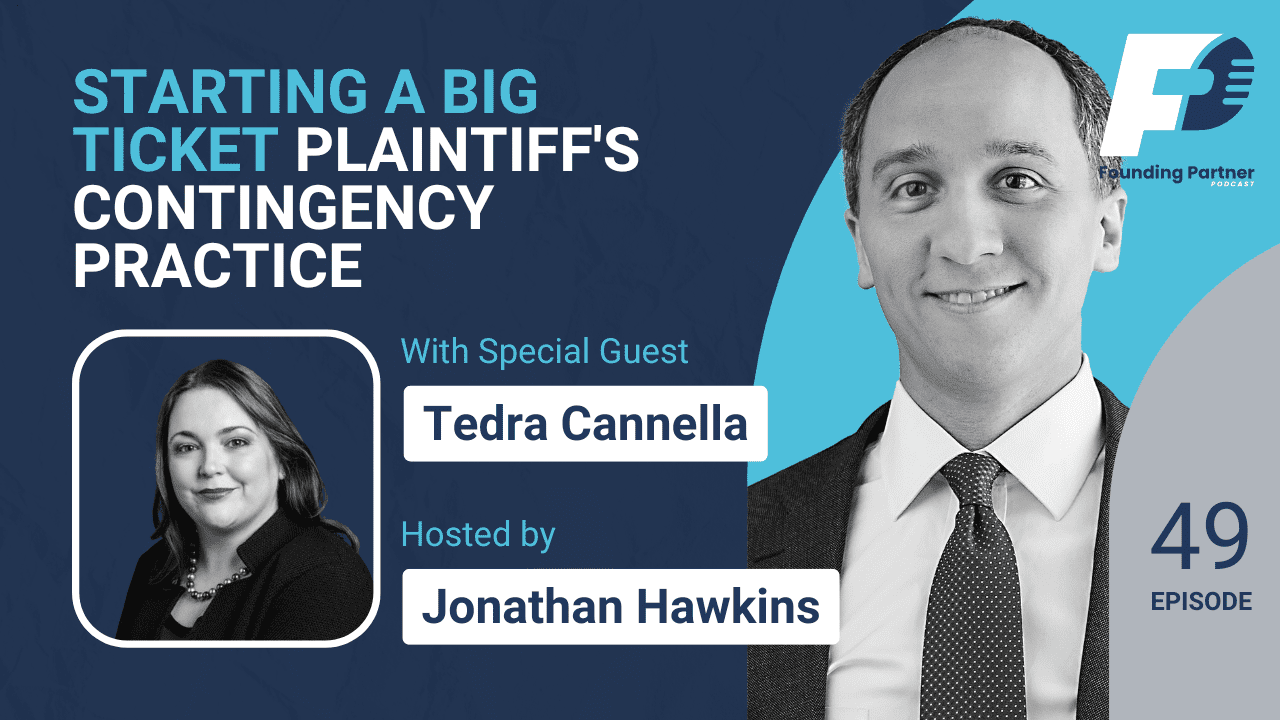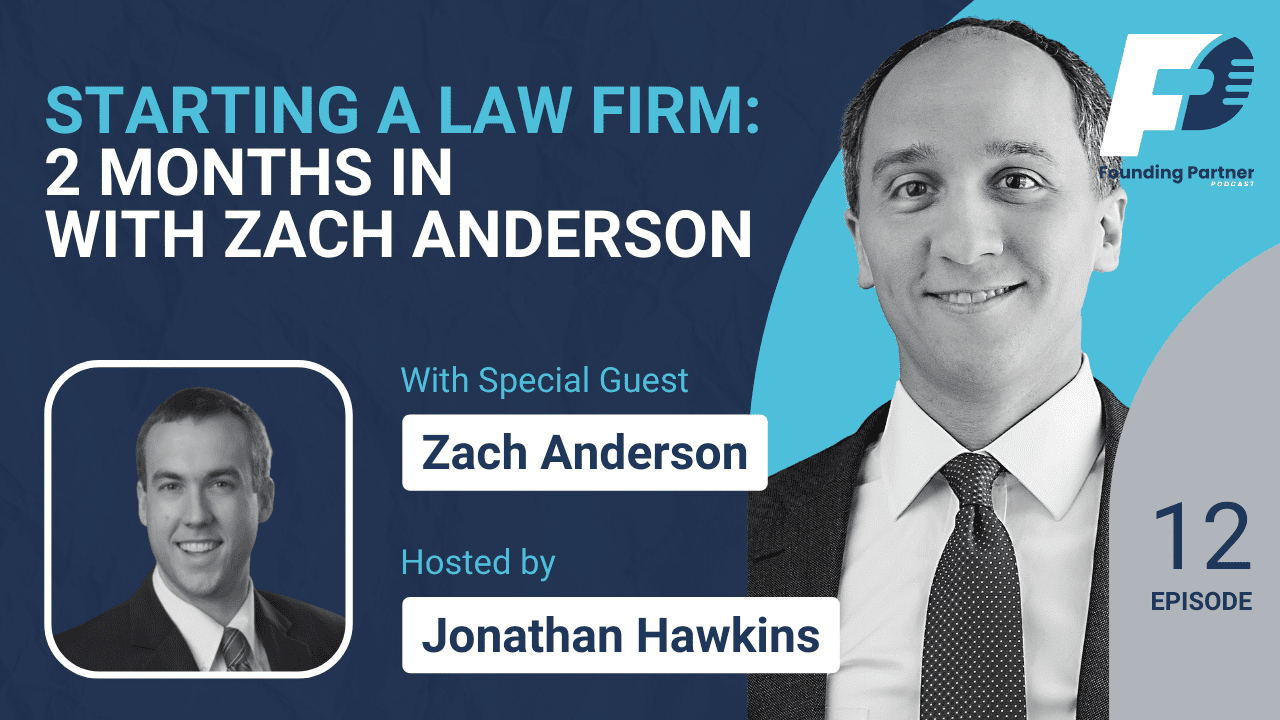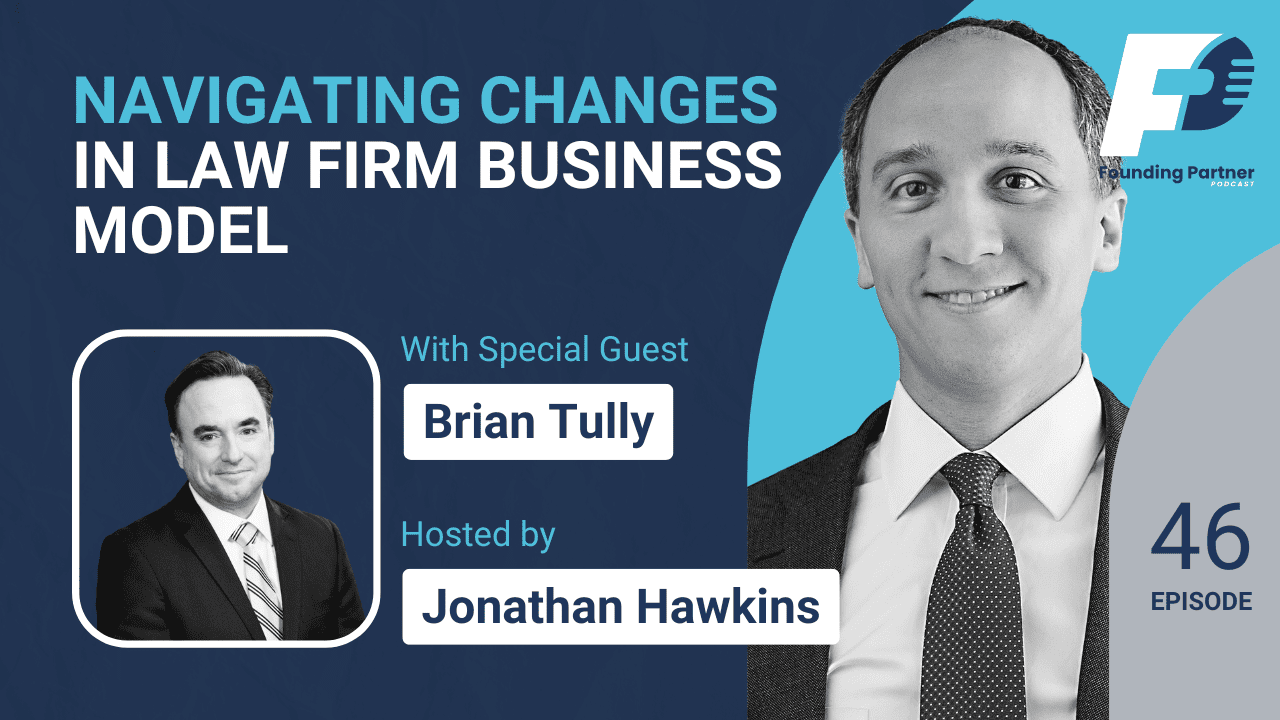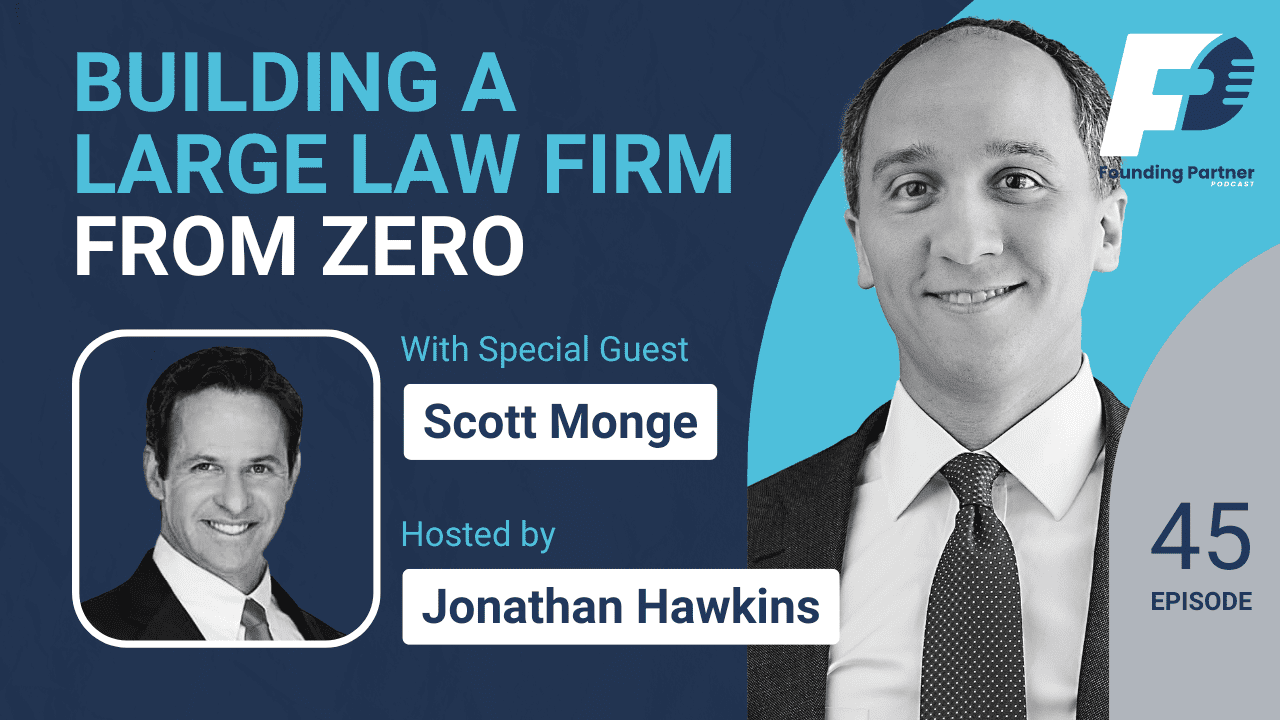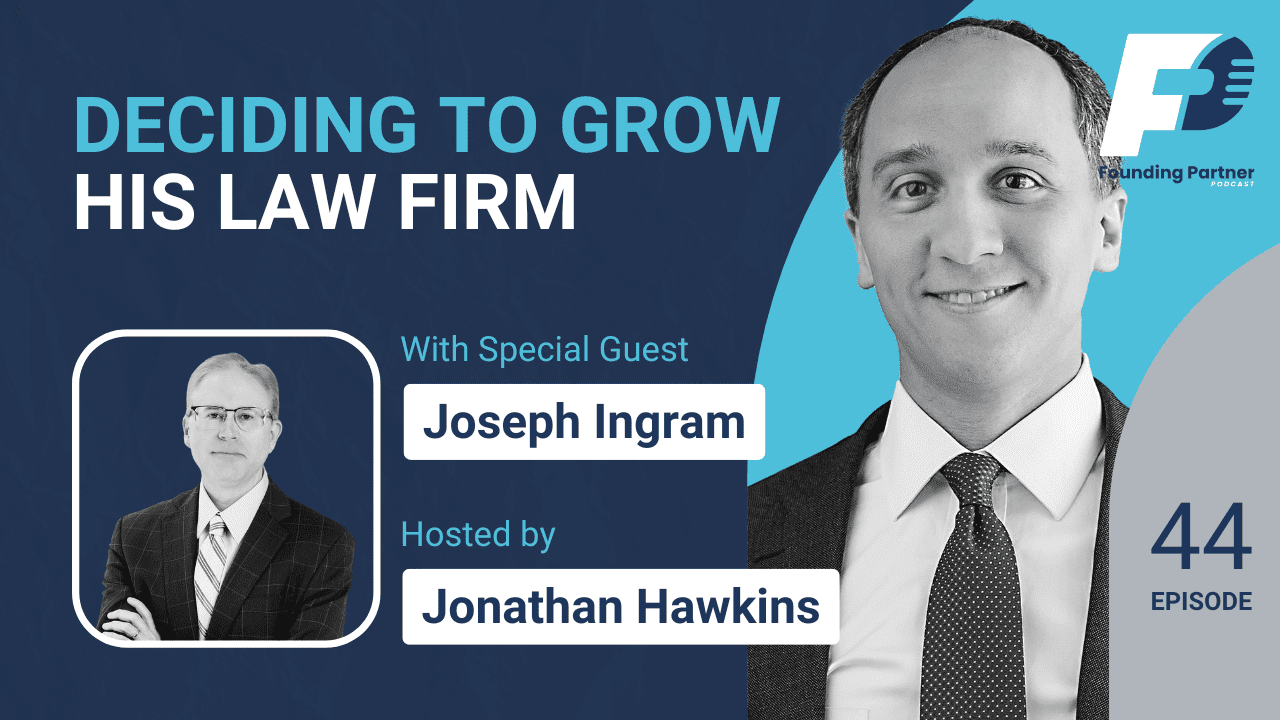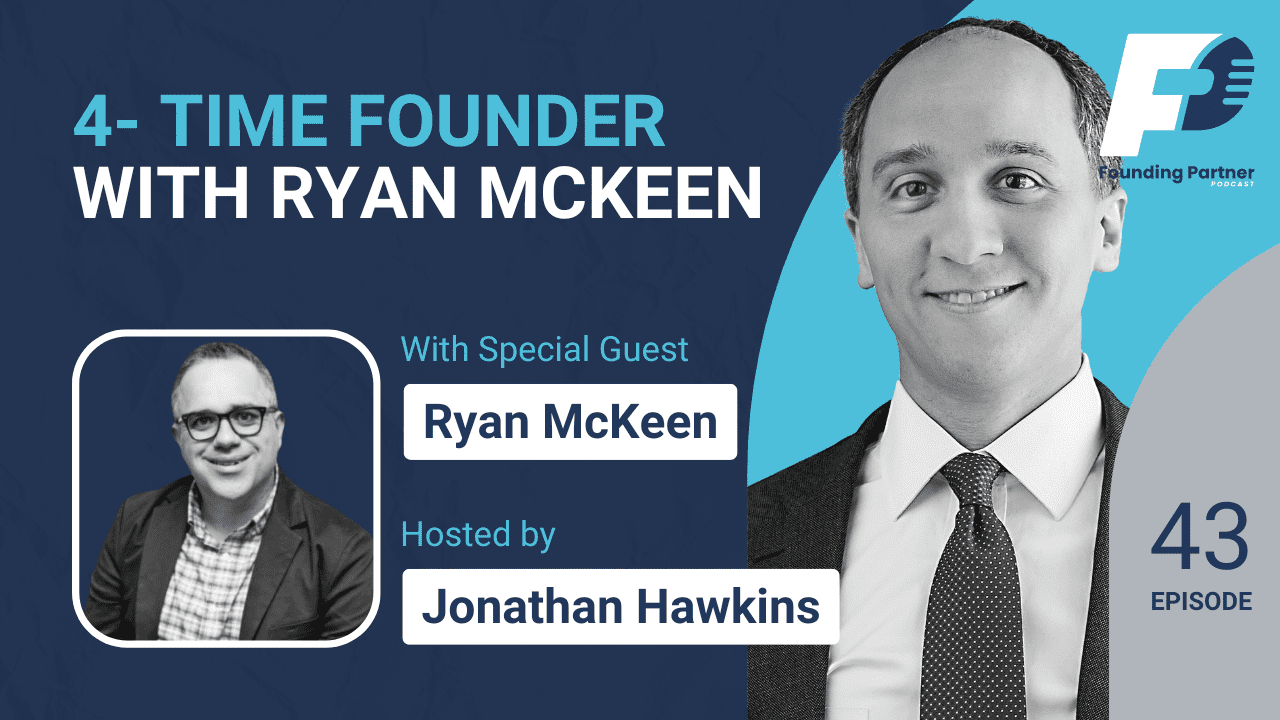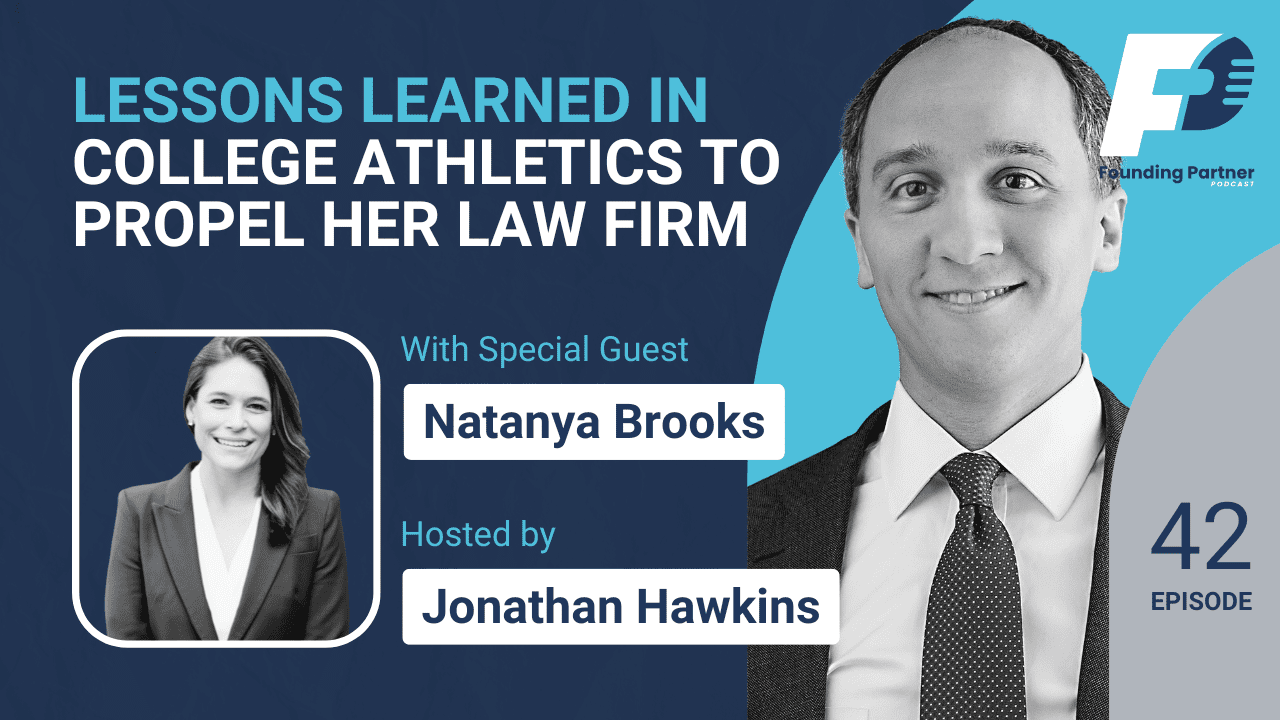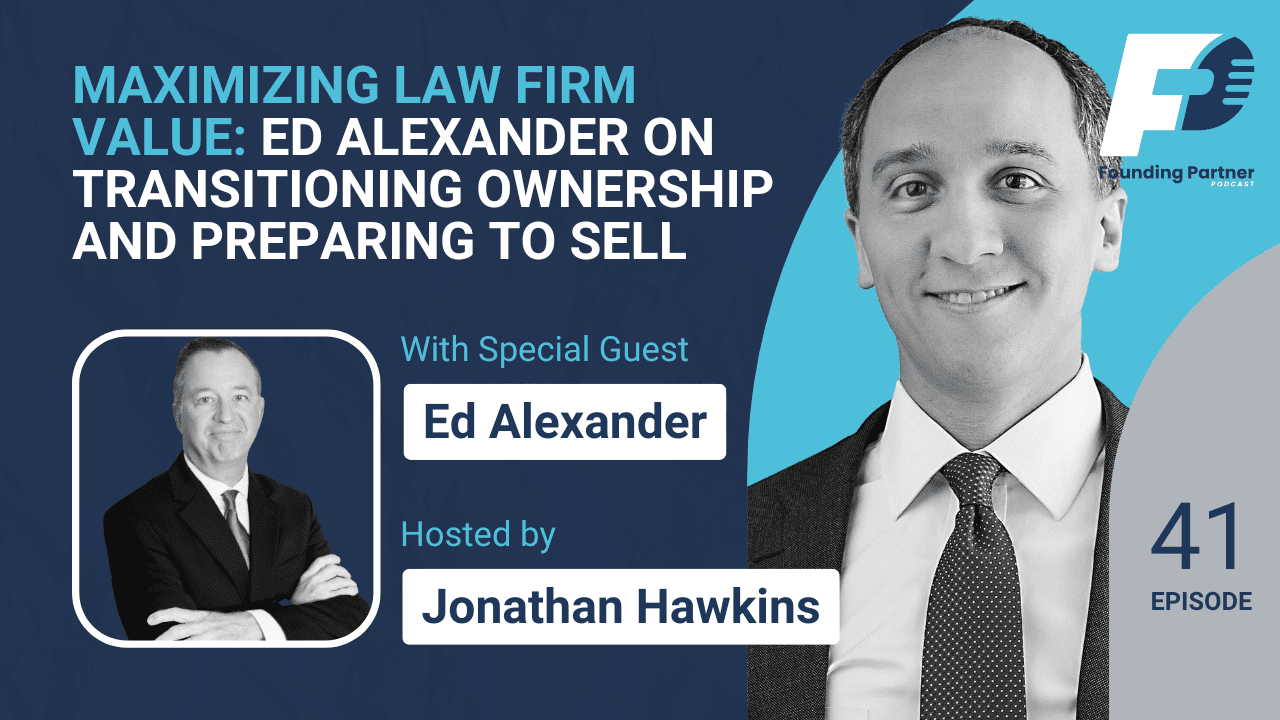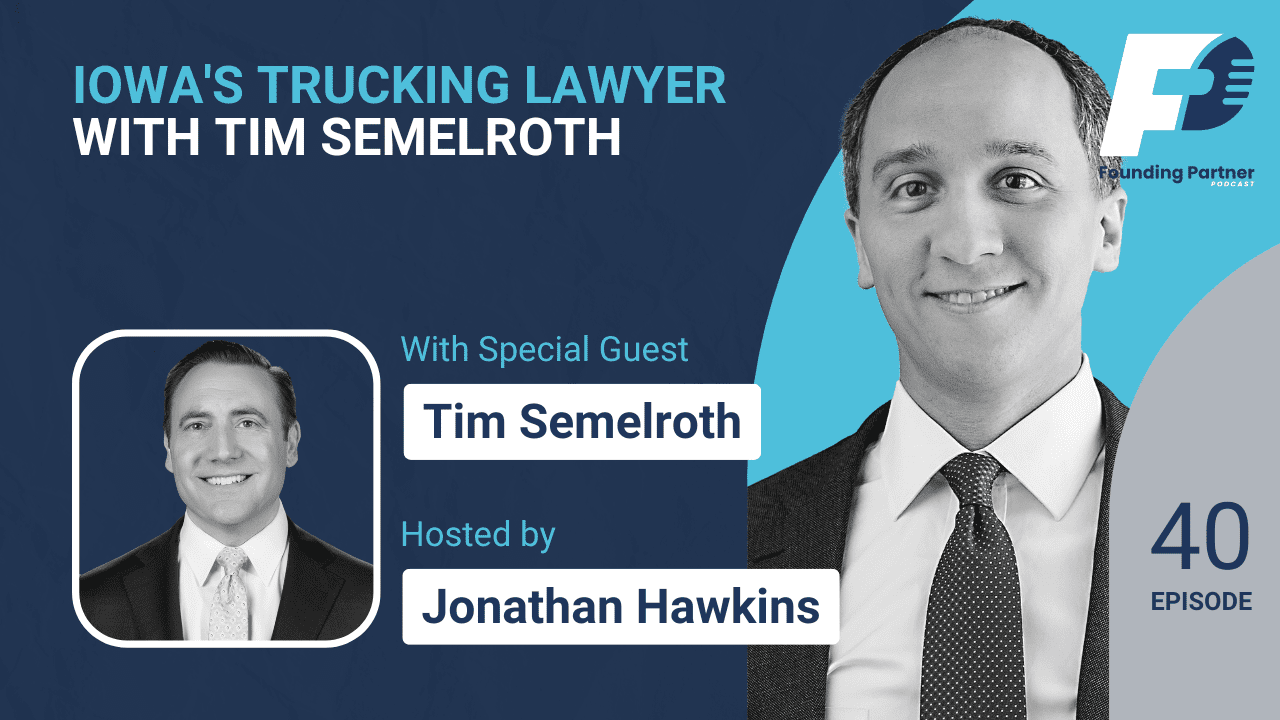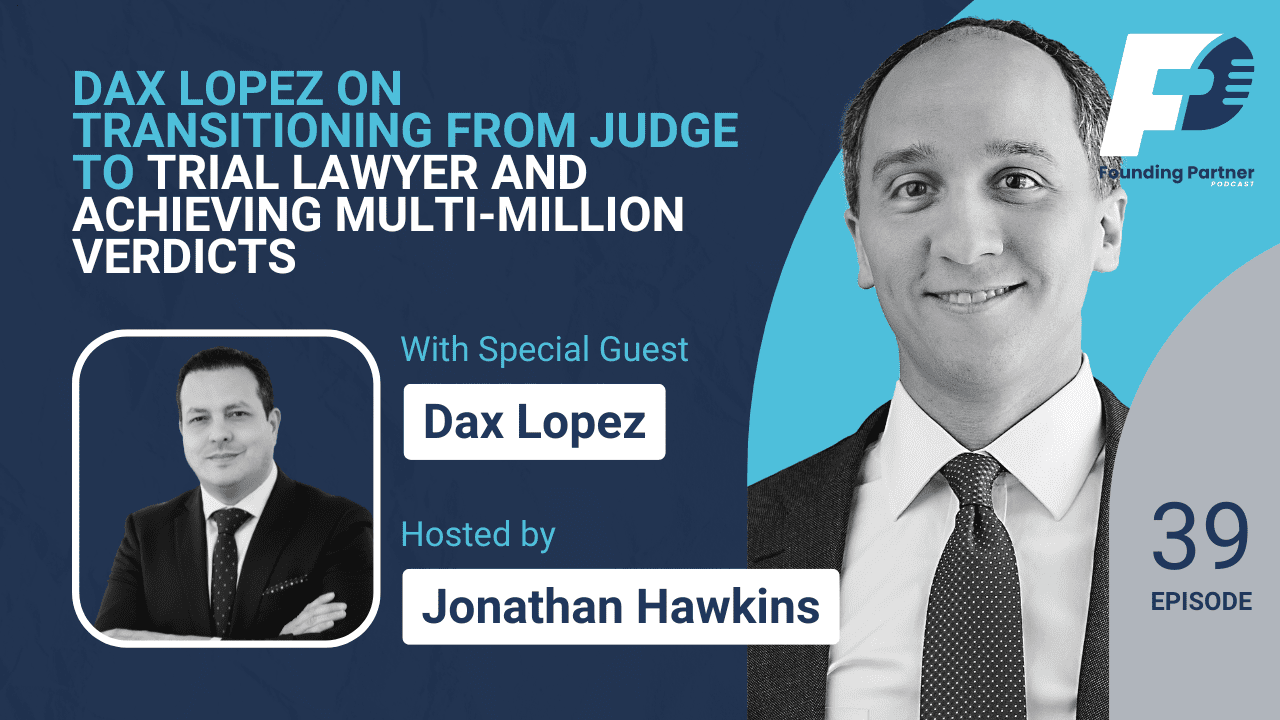Jonathan Hawkins: [00:00:00] Alright, welcome to Founding Partner podcast. I’m Jonathan Hawkins, your host, and today we’ve got Zach Anderson joining us. We’ve been talking to law firm founders, and Zach is a brand new law firm founder, and I wanted to get perspective of somebody who’s pretty fresh along the journey. So, welcome Zach.
Why don’t you introduce yourself. Tell us about your practice, where you are and all that.
Zach Anderson: Yeah, thanks Jonathan. I’m Zach Anderson. I’m the owner of Anderson Estate Planning. We’re located in Huntsville Alabama, which is in the north part of the state, in the foothills of the Appalachian Mountains. We get hot enough in the summer to be the deep south, but we get colder in the winter. Then you might suspect if you’re not familiar.
With parts of the deep South I help clients with estate planning and asset protection. We help Alabamians protect what matters to them the most With sophisticated estate planning techniques[00:01:00] we do a lot of revocable trusts. We do a lot of a fair amount of irrevocable trusts. We do revocable trusts that transform into irrevocable trusts upon certain events, usually upon death of all trust makers.
We do estate planning exclusively. Of course we do trust administration and things like that as well. But whatever the threats our clients have to their wealth, whether it’s long-term care costs, whether it’s a lawsuit particularly if they’re a small business owner whether it’s a child that needs protection perhaps from themselves or from a creditor that they might have.
We take all those challenges. We look at the assets that. Our clients have, and then we devise a plan to protect each of those assets in accordance with the client’s goals. You know, some clients want to forego some asset protection to make it up a little bit simpler. And I lay out all the facts and let them decide.
So, I’ve probably gone into a little bit too much depth at this point, but that’s the story.[00:02:00]
Jonathan Hawkins: Alright we’re gonna dive deep, but before we do, so you’re in Huntsville that’s on the north side of the state. I grew up in Mobile on the south side of the state, on the Gulf coast. I did get up to Huntsville way back when for Space Camp, but I really haven’t been there in a long time. So tell us a little bit about Huntsville, how big it is.
It you know, what’s the vibe of the city and then. To follow on that or where I’m going with that is how far geographically does your practice reach? Is it just sort of the Huntsville area or is it statewide or more,
Zach Anderson: Yeah, so Huntsville was like many areas, a very sleepy little textile mill town until the 1950s when Marshall Space Flat Center was, you know, born in the Huntsville area. And after that we’ve got the army base. So really Huntsville is has really blown up since 1950, particularly in the past couple [00:03:00] years.
It’s really boomed in terms of. Population. We have a lot of government contractors that work on the army base called Redstone Arsenal. We have a lot of people that work in tech companies that whether they contract with the federal government or not, our population is a little bit older than one might suspect.
I have found that a lot of people move here. To help out with grandchildren. So we’ve got a little bit of a trendy vibe that you might see online or in social media, and certainly that’s true, but I think our population does tend to, to skew a bit more older than people might suspect.
But.
Jonathan Hawkins: Is it growing? Is it continue to grow? I mean, is there an influx of people.
Zach Anderson: There is, we are, we’re growing pretty rapidly. I think we’ve got 400,000 in this county, Madison County, and then the neighboring counties, particularly Limestone directly to the west, is actually growing much faster. Although the number that they’re starting with is lower, but they are [00:04:00] quite, they’re growing quite rapidly.
The whole metro area is growing. We are getting a lot of people from. From California. We’re getting a lot of people from other states that you know, perhaps they’re seeking lower taxes, perhaps they’re seeking more land. Perhaps they’re seeking humidity for some reason. I don’t, no, I’m just kidding.
No we’re growing pretty rapidly and we’re struggling to keep up. I was talking with my office mate. Just a minute ago, we, he was like, I can’t get an electrician to call me back. Well, the same is true for hopefully to not that extent with estate planning attorneys and people who work in restaurants.
You know, we’re all business people, business owners the infrastructure, the services, whether you’re an estate planning attorney or a plumber, we just really haven’t been able to keep up with the population. So what a fun challenge to, to be able to tackle.
Jonathan Hawkins: You know, I, and I ask some of these questions because I’m a big believer in niche practices and you’ve created a niche. You’ve chosen a niche. Sometimes if a town [00:05:00] is not big enough, I. The question is can you survive just practicing in one or maybe a couple niche areas? And so it sounds like you’ve got sort of the wind at your back a little bit with people coming in, older population.
That’s good. So how far geographically do you reach with your practice or do you want to reach.
Zach Anderson: Yeah, great question. Eventually I’d love to reach all across the Tennessee Valley, as we call it. The Tennessee Valley technically extends a couple of states, but largely it’s considered the counties around Huntsville, Scottsboro, perhaps all the way over to Florence and the west part of the state. So I’d love to, to have a practice that spans overall to North Alabama.
Realistically, I pr practice in two counties. I guess three counties. Three counties, Madison, Morgan and Lifestone. They’re all within about forty-five minutes from me. Usually when you know a lot of. My things either need to be done in person or I like to do in person, and I [00:06:00] use Zoom when I can, like when we’re, you know, snowed in and there’s ice on the roads.
But I really prefer to be in person for when I can. And if, you know, one spouse has to zoom in for their job, we can make that happen. So, sometimes when it’s a forty-five minute trek. Potentially longer in traffic. You know, it’s you know, you either take a bath on fees a little bit or you ask your client to shoulder that, and both of those I really don’t love doing so I could see us going multi-office eventually, for sure.
Jonathan Hawkins: All right, so I don’t know if we’ve covered this yet, but when did you start your firm?
Zach Anderson: I opened my doors on November 15th, 2023, so we’re about two months in, and that’s with. Christmas, Thanksgiving, new Year’s. And we had a week where ice were on the roads. Ice was on the roads a couple of weeks ago where nobody did anything. Publix was not open, nothing was open. So it’s been two months, but sometimes it feels like forty-eight hours, and sometimes it’s been, feels like it’s been six months.
So I, [00:07:00] I don’t really know.
Jonathan Hawkins: So this is cool. So you are in the thick of it. You are in the thick of it. So is it just you? Do you have any help? You mentioned an office made a minute ago, but do you have any staff, any virtual staff?
Zach Anderson: It’s mostly me. I have a part-time paralegal that I worked with at a previous employer, not my directly previous employer, but before that. When I was, I guess super young and inexperienced and she helps me out with some basic things. She’s also made it clear that she’s enjoying retirement.
And I thought, ah, well, oh, well I’ll take you for what I can. But it’s mostly me and that will change probably within three to six months. Because one of the things we’ll probably talk about a little bit later directly or indirectly, is. I think I’ve, I have found that I’ve maxed out on what I can do fairly quickly.
And it’s not because I have 100 clients per week beating down my door, my phone line. It’s just [00:08:00] because when you do everything, you know, if you have sort of a holistic practice like I do, you know, we’re not kind of a. We’re not just gonna give you a power of attorney and charge you 200 bucks and send you on your way.
We try and do a little bit more value add than that. When you do you, you know, the level of work that I do, you max out pretty fast. So, I’m learning that and I’m gonna respond and it takes investment, it takes mental toughness. Especially if you know, perhaps didn’t grow up around entrepreneurs or maybe you know, not in an entrepreneurial family, but it will need to be more than me at some point.
Now what that looks like, I’m open to virtual, I’m open to in-person. I’d be open to a very young person in school or at our local community college. We have a terrific community college, Calvin Community College here in. In the Huntsville area. And maybe they just wanna learn about how a law office works.
So I don’t know exactly what it’s gonna look like, but I know it’s gonna happen.
Jonathan Hawkins: Yeah, I want to get into all that. You know, we have, you know, this podcast is [00:09:00] for people who have started firms, but also those who want to start firms. So I think this is gonna be a good lesson here today and sort of what you’re going through. You are walking through the fire as we speak, so you are in it.
So this is gonna be great. So. Before you started your firm what were you doing? Were you at another firm?
Zach Anderson: I was at a firm that did a lot of estate planning a little bit of asset protection planning and did a fair amount of real estate as well. And I think that was good for me to get that background because sometimes with, particularly with estates and probates, sometimes titles can get a little squirrely.
And I think having a real estate background actually ended up. Ended up helping me. So yes, I did come from a private practice where I did mostly similar things to what I do.
Jonathan Hawkins: You did some real estate before and now you’re not doing it. Did you sort of give that part up as part of your, as the formation of your new firm gave up the real estate piece?
Zach Anderson: [00:10:00] Correct, I did. If I have a you know, sometimes, I mean I can do maybe a little clever here and there, maybe an airship affidavit to avoid probate court. And protect money and provide pretty significant value to my clients. So I’ve still got shades of that in my practice, but as far as residential real estate, cleaning up title and certainly doing the closings, no.
I, I wanted to niche in what I do and let other professionals do the same.
Jonathan Hawkins: So did you always know you were gonna start your own firm or is this something that came to you after a few years of practice?
Zach Anderson: No, I didn’t and I’ll take a minute on this one. If I could, so I went into law school thinking that I wanted to be a criminal prosecutor and put the bad guys in jail. And I wanted to be in front of juries and things like that, and. Eventually I ended up kind of changing my mind on that and I changed my mind on a [00:11:00] bunch of different things.
But while I, you know, I think every once in a blue moon I think about, you know, what if, but I think I made the right decision. But anyway, we don’t need to go into that. I went in thinking I was gonna do that and then like most law students who are not 100% of what they want to do. I ended up afterwards basically taking a job at the biggest firm I could, and that was a good experience in that I met the professional who I mentioned earlier.
My my current helper assistant, I don’t know, she wants to remain retired, so I guess we’ll keep her retired, but she helps me out a good bit. I got to meet her and meet a lot of. Interesting people there as well. But you know, the road we take is is winding. And I actually had something else I wanted to mention about that, but I can’t remember.
I’m now gonna have my pen and paper here, so if I have two points I’ll remember to say them. But the. [00:12:00] What was I gonna say? I can’t remember. I’ll let you go with your next question. If I think of it, I’ll just bring it up whenever,
Jonathan Hawkins: Well, yeah. So just quick reminder. So I was asking you if you always knew you wanted to start your firm or if you were gonna start a firm
Zach Anderson: so yes. Okay. Just you saying that even though that’s not directly related to what I was thinking, you had, you made me think of. It’s a well done and thank you. Here’s what I found. I started. Dipping my toes into LinkedIn kind of randomly. And I started meeting different people who not only had either started their own firm or owned their own firm, but they were very into the business side of law, which most lawyers I think are not.
And they were some in my home city, many in jurisdictions and states far away from me. I kept, you know, exploring these Facebook groups where people would post about, you know, [00:13:00] running a law firm. Just a couple of those groups. Maximum Lawyer is a really good group. There’s a group called Estate Planning Professionals that’s really good if you’re towards estate planning attorneys.
There’s estate planning lawyers, tech, Junkies that we talk about different. Practice management systems and things like that. And here’s what I found. Here’s what I found Jonathan. I think your listeners will find this potentially in insightful, dare I say insightful, as I started talking with people like that, business minded attorneys, entrepreneurial attorneys, business owners, people who had those aspirations, people who did that, or maybe their spouse did that.
I started sort of becoming like them. I started sort of thinking like them, and I think it’s a big testament to you are who you surround yourself with. I think if you’re around negative people a lot, you’re gonna be a negative person. I think if you are around people [00:14:00] who believe in themselves and believe in their friends and believe in.
Hard work gets results and thinking something and doing it properly can lead to really positive results. And mountains are meant to be climbed. They’re not meant to be just stared at. I think you’ll find that you become more like that. I.
Jonathan Hawkins: That is a great point. I love surrounding myself around growth minded people whether in the law or outside the law, and whether I know them personally or just the content I consume. And it definitely changes the way I think. So big believer in that. So, okay, so you surrounding yourself with these folks, you begin to think, Hey, I might want to do this.
How did you know you’re ready to do it? How did you say I’m doing it?
Zach Anderson: Basically, I [00:15:00] stumbled across a line of thought about basically becoming a different person mentally and. The idea being and I’m still new to this so I may not verbalize it correctly, but if you go somewhere mentally in your mind before it’s there, the subconscious mind cannot tell the difference between what is real and what is imagined.
And if you have in your subconscious mind this idea, whatever it is, whether it’s getting physically fit. Whether it’s moving across the country and starting a new life, or whether it’s just quitting your job and starting a business, if you put it in your mind, you’re gonna get it. And I said, you know what?
What the heck? Let’s try this thing. And I tried it and it became such a [00:16:00] tension in my mind between where I was at a decent job with people that I liked working with. Yeah, but that was in sharp tension with I’m this business owner and I’ve started my own law firm and we’re helping people and I’m making enough money to keep my house and keep my lifestyle and maybe even eventually raising it.
I haven’t got that far mentally yet, but we’ll get there later. So when I actually did that and sure enough, it actually worked, the tension between where I was. And where I was in my mind became so great that outweighed the tension of, oh, well what if, what, where are the clients gonna come from?
Things like that. So it’s not that it wasn’t scary, I mean it was, I’ll just be real with your audience. I’m, you know, I’m on the younger side and I’m not sitting on a pile of cash in the savings account. We couldn’t retire tomorrow if we wanted to. So it was still [00:17:00] scary. It’s just the fear of not, the fear of not meeting the upside became greater than the fear of the downside.
Jonathan Hawkins: I can relate to that completely. That sort of mindset or that tension is what has led me to, you know, take the steps to start growing this firm more than it. Was before, but let’s talk about this. There are lots of people out there, lots of lawyers that say, Hey, I might wanna do this, but they never do it.
They never take the step. And so sounds like in your mind it was the tension and you just had to do it. You were compelled to do it. Is that right? Or how did you know the moment was right? Or did you just say, I’m, it’s now or Never burn the ships. We’re going.
Zach Anderson: Yeah. To get a little bit more specific. I had a timeline to [00:18:00] be clear. This was not, and I think you hinted at this with a question earlier. This wasn’t a five-year plan for me. This was, I may have had, I. I started hanging out with people who were more entrepreneurial by nature, maybe 12 to 16, to 18 months ago.
And it took a few months of them positively infecting my mind for me to actually think about, one, could I do this? And two, do I really want to. So I would say the idea started in my mind to go out on my own. I don’t know, a few months. It probably under a year. So it wasn’t some five-year plan, but I did have a couple of timelines in my head and I moved it back once or twice.
And I moved it up once. So I I moved it up once and actually I’ll just I’ll be honest, and I told my former employer this and we’re on great terms. I said, [00:19:00] you know what, it’s November. I think I told him November 1st. And had two weeks. November 15th was the day either I left, or it might’ve been November 14th.
But I said, you know what? We got a lot of holiday time coming up with Thanksgiving and Christmas, and I also know that just most estate planning offices are slower than two. So not only do we have the holidays, but you know, I’m gonna be. Not as efficient simply because we don’t have as much during that season.
And I was the same way at my firm. I said, you know, I could take those and completely legal. But I said, you know what, I’m not gonna do that. I don’t think it’s fair. I, so, I did that and I moved it up and I got, like I said, when I kind of went there in my mind and I wasn’t there, I got sort of almost anxious to do it.
So I, I don’t think there is a perfect time because my story shows why I moved it back twice and then I moved it up once. So, no, I don’t think there’s a perfect time. Some would say, I will say, you [00:20:00] know, not everybody is meant to, not everybody wants to. Own a business. Some people like I, some people I think I’m crazy and I’m like, I look, I don’t know.
I mean, I pay an accountant to do the QuickBooks. Like I don’t know what I, you know, I know estate planning, but for the things on the business side that I don’t know what I’m doing, you know, I pay smart people and that’s capitalism I guess. But yes, I don’t think there’s a right time.
Or wrong time. But I think if you’re starting to have the thoughts, think on it for a month, get around people who have done it, whether they’re, you know, as you are further along in the journey or whether, you know, like I am and just starting out and just talk to ’em. What I found is that people who have an idea in their mind, a goal, and then they try to reach it or they reach it, maybe in the entrepreneurial context or maybe not.
I found those people to be disproportionately helpful. Just willing to donate. You know, we won’t talk hourly rates, but I assume you don’t work for free. [00:21:00] Jonathan, you know, you talked to me and you helped me out a few months ago, and probably a way that was more significant than you might expect.
You know, the people who, like people who listen to your podcast and people who are on your podcast. They tend to be disproportionately helpful. So I say for anybody thinking about it, go to the people that have done it. Either they’re, you know, a baby in it, or they’re a pro, and just talk to ’em. I bet they’ll be willing to talk to you.
Jonathan Hawkins: I think that’s so important. I think you fit on some good points there. I mean, definitely surrounding yourself with people that are like-minded people who’ve done it. People that can help you along the way. That’s huge. So when you started, did you have clients with you or did you start at Ground zero?
Tell us about that. I.
Zach Anderson: So I had referral sources who liked me. I don’t know if I had any clients per se. I may have had one or two. Hanging out there that we were in the middle of something, but my former employer and I came to an agreement on. But even those are, [00:22:00] they’re not, you know, major clients like one might traditionally think of.
It’s worth noting in my practice, I work a hundred percent with individuals. So unlike many attorneys, I don’t have corporate clients. Even my clients who are business owners, I don’t represent the business because the matters that. We have with that, other than maybe, you know, succession planning for when they become incapacitated or pass away.
I’m just, I’m not an expert in that. So I have zero corporate clients. So for me, I didn’t have clients per se, but I did have referral sources and I will not say that I started. You know, cultivating referral sources when I got outta law school with the idea of starting my own law firm. ’cause that’s not true.
I am just kind of a people person. I like talking to people. I like learning things from people that I might not agree with. Like, I give everybody the time of day. As long as you’re in good faith, which [00:23:00] ninety-nine percent of people act in good faith. So I ended up kind of naturally. Some referral sources and some people that like me and trust me with their clients.
So I did start with that.
Jonathan Hawkins: So whether you did it by design or by accident, you did have referral sources in place, so you were comfortable that even if you didn’t have clients you felt pretty, pretty comfortable that you get them soon. Is that fair?
Zach Anderson: That’s correct. And you know, I went there in my mind, I imagined myself, I. Sitting in an office that wasn’t, ’cause I didn’t know, you know, a month, well, maybe not. Yeah a month before I started, I didn’t know where my office space was gonna be, but I knew a fellow attorney. That had an office, and I apologize for the sound delay there, but I knew an attorney that had an office that had, she had like a spare room.
And I thought, you know what, if I [00:24:00] asked her, she’d probably let me go in that spare room for pretty affordable rent because it, I don’t even know there wasn’t enough room to meet with clients in there, but I imagined myself in there looking at my calendar and there it was lit up with appointments and I imagined that, and I went there in my mind.
And it did not happen the way I expected to, and certainly the setting was not correct. But you know what? I ended up with a situation where my calendar’s rather lit up with appointments and, you know, I’m not gonna take home a million dollars this year. But you know, for me, where I’m at with limited staff and just being in business two months.
You know, we are relatively filled up with appointments, relatively speaking. So yes I was confident that I would come in with some referral sources, but also I imagined myself, I. In that situation, and I educated myself with people who are much more [00:25:00] knowledgeable than me about the power of imagination.
Imagination is I didn’t know until I became educated on it. It’s not this thing for children to do coloring with, although that is a part of it. The imagination is incredibly powerful. I would imagine we’re the only creatures on the earth that can do anything. Close to it. It’s incredibly powerful and I learned how to put it to work for me and I’m, you know, one, I wanna do that 100 steps further, but you know, I’m on step one right now.
Jonathan Hawkins: Another piece. It’s very motivating when you have zero clients and you’re the one that has to put food on the table, right?
Zach Anderson: It. It sure is. It sure is. You know, I I got married a little bit later in life. I’ve been married about seven months, and you know, I, my father-in-Law, I. He was in, he was a colonel in the Army. He just retired after, I believe, 30 years in the United States Army. And he had [00:26:00] always, he scared me for about 15 minutes.
And not that he’s not worthy of respect, most certainly is, but I realized after a few minutes, you know, he respected me because I take life seriously. And I treat his daughter well and certainly try to but when I told him I was doing this, his expression was like only about 70% on board.
He was like, oh, okay, let’s, I said, you know what that’s some motivation right there. You’re exactly right.
Jonathan Hawkins: So, you know, I talk to a lot of folks that are starting firms or maybe. Are forced to start firms, whatever, you know, the big question they have or a lot of questions, what do I do? I don’t know what to do, how do I set this up? You know, how do I get the right tech in place? Malpractice insurance, all of these nuts and bolts of a practice, they don’t know what to do.
How did you figure that out? And, you [00:27:00] know, looking back on it. Is there anything that you didn’t do that you feel you should have done early or anything you did do that you feel like, Hey, I didn’t need to do that.
Zach Anderson: Oh, I’m so glad you asked this. So I’ll say two things here. First. Do some research beforehand. I did that. I looked at practice management software and using the Facebook groups that I talked about earlier that, you know, are basically just lawyers who are more entrepreneurial inclined and try and use technology to have a better client experience and things like that.
I was always reading. Th things like that and still do in my spare time. I guess I’m I watch less college football these days. I’m, I suppose, but I’m always reading about either the business side of law or perhaps a new case that has come down or something like that. Of course in my world, let’s see, we’ve.
We’ve got Secure [00:28:00] 2.0, the Secure Act, the second iteration of the Secure Act has some fairly robust changes. Section eight housing, which is relevant for many of my clients who have a child with special needs that has become more special, needs friendly. So I’m not gonna go into a whole lot more detail, but doing the work on the front end and just, you know, in my opinion, it’s not hard to.
Read about and dive deep and research things that you find interesting. And I certainly find my area of law interesting as well as the business side. That’s the first thing I’d like to say. One other thing about this question, because someone from my law school class called me this week and said, Hey, I’d like to start my own firm and would love to just bend your ear.
And I was like, absolutely. We’ll get a time on the phone. And he asked that question and I. In my opinion, all the logistical stuff about getting started, I think if you are a [00:29:00] reasonably conscientious, diligent person, I think you are overblowing that in your head. Now, going from one employee to 10. Ask me in five years.
I can’t speak to that. I just opened it two months. I can speak to going from absolute zero to getting a website, getting my practice insurance, getting up and running, so to speak, and I will tell you, because a lot of your founders, this was 10 years ago and they don’t, they may not remember. I will tell you the logistics of getting started and all those questions.
I think you’re probably over blowing it in your head. You can find the answer, you can find somebody that knows the answer, and if you fail, you can fail forward and adjust. I, I learned very quickly, for example, and this is really not supposed to be a joke, although we will probably chuckle when you hear it.
I, it didn’t take [00:30:00] me long to mess up QuickBooks, and you know what? It didn’t take me long after doing that. To call my accountant and say, Hey, I’m willing to, you know, open up the checkbook. Can you help me? And he of course said yes. And that’s our economy. So, you’ll become resourceful. You’re probably overblowing the logistical issues in your head if you want to do it.
Chris Berry, and this is the last thing I’ll say on this. Chris Berry is a certified elder law attorney, I believe out of Brighton, Michigan, a suburb of Detroit. I believe I, he’s probably. Having a pretty good, well, I guess they lost on Sunday, but the Lions did great this year. I was gonna say he is having a good day, but I think they did lose, but they improved a lot from last season.
Chris, I wrote Chris a note and said, love your practice. You became certified as an elder law attorney really young, and now you’re a financial planner. Taking your knowledge of the. Particularly public benefit side of the elder law space and you’re using it in financial planning. I’ve never seen that before.
I’d love to, [00:31:00] to bend your ear for 20 minutes if you don’t mind. And just like we were talking about before, you know what he said, Jonathan, he said, absolutely. Here, let’s schedule a time. But the point is, he told me something that I’ll remember probably for a long time. He said, if you’re thinking about doing something, you should probably just do it.
And I believe he was talking about investing in marketing and getting more leads in that he could help. And he said the first time he did it, he was very nervous, but he said, if you’re thinking about doing something, you should probably just do it.
Jonathan Hawkins: So we’ll get I do wanna talk about how you market, but before we go there, you mentioned the QuickBooks. When people come to me, I always tell ’em, just go get a bookkeeper. Don’t do it yourself. I tried for like a month. I hated it. It just, it sucks. It’s a waste of time. You’re probably gonna make mistakes.
And then you have to do it again the next month. It’s just way better to outsource that. That is number one. So [00:32:00] you’ve been in two months. What’s been, other than perhaps the bookkeeping, what’s been your biggest challenge so far?
Zach Anderson: Yeah, I also lasted about a month on QuickBooks, so, that’s funny. I would say my biggest challenge just in two months is juggling everything. And I know that’s not where I’m going to be even in as little as three months from now. W I’ve already made adjustments with that. I am no longer the bookkeeper. I am I knew I didn’t want to make the website. Some lawyers, you know, it’s always a question of can you go get the knowledge and know-how and tools to do it yourself or you hire somebody just like doing something on your house. Really, for me it’s usually always just pay someone because I’m pretty inept at manual labor.
But, so I knew that there were certain things that I couldn’t do and I have invested, I’ve paid, you know, it hurts to, especially when, you know you’re not sitting on a pile [00:33:00] of cash. It hurts to have that money going. It should that means your parents are, or your family raised you, right?
But, you know, you gotta grow you gotta sacrifice to grow. Nothing nothing comes free. And nothing comes from nothing. So, I’ve already improved with being able to you know, juggle less and pay professionals to do it. But I know that there’s a whole other level that we’ve gotta go to on that and I’m prepared to do that.
So I would say juggling everything at this point I.
Jonathan Hawkins: In the point you made about, I mean, it costs money to invest in these. Things. And right now an early founder of a firm may not have the money to invest in that or those things. And it’s finding the balance of when to do it and when to wait. That’s a common question. I hear it. You know, is it time for me to hire somebody to help me?
The answer is usually yes. But then the next question is, I’m scared I can’t afford them. And they look at the full [00:34:00] salary for the year plus benefits and whatever. Where really you should step back and say, all right, really it’s a week at a time or two weeks at a time. And if it doesn’t work out, you can always pivot.
So, but usually when you hire somebody whether it’s an assistant or paralegal or whatever, it starts to clear your plate a little bit. Now that first, you know, period of time, it probably doubles your work ’cause you’ve gotta train them and. Delegate and all that, but once they’re going a little bit, then all of a sudden you have a little bit more time and then you realize six months later you’re like, wait, I’m actually bringing in more revenue now.
And you see that the investment was worth it. So, so yeah, that’s coming and you know, you’re in the middle of it. Let’s talk about the other big piece of starting a firm is you gotta make sure you get clients. So what do you do and how are you approaching the marketing, the business development for getting the clients?
Zach Anderson: So this is something that [00:35:00] relates to a previous thing we talked about, and that is I did some work ahead of time before I started my firm. And kind of, you know, creating a little mental filing cabinet of some things, you know, what to do as far as marketing and the people who are a lot smarter than me that I listen to, they said, start with this question, do you have more time or more money?
And if you have more time, get that debit or credit card for the business. And buy everybody a cup of coffee because you never know. Some of my referral sources, I, you know, we met in kind of a really tangential way, for lack of a better way to put it. And then sometimes, you know, you buy a nice lunch for a financial advisor and then you do it again in a month, and then you know, send them something for free and.
You know, you think you’re gonna get business and then you never hear from ’em again. That’s just the way it [00:36:00] works. Sometimes life surprises you in the positive and the negative way. But the point is, I am at the space now where I do have more time than money. Now I am approaching that actually, we’re actually probably closer to in the middle there.
But the point is, while you know, we don’t have. 10 calls a day. Coming in the business, I am continuing to develop relationships, nurture relationships, try and provide value for free. Last week I sent an email to a few advisors, financial advisors that I work with, and said, here’s a free temporary guardianship nomination for your clients with minor children under 19 in Alabama.
It is yours for free. I don’t, no, there’s nothing. You can send it to clients. You cannot send it to clients. It’s yours for free. Do with it what you wish. So I’m doing a lot of that sort of old-school marketing, I suppose. And then one other thing [00:37:00] I’ll mention as far as marketing, I also read from people who are a lot smarter than me about this.
And they said, you know, before you. Yes you want to have paid marketing eventually, whether that’s funneling to a seminar or Google ads or whatever, search into optimization. But there’s a lot of things you can do for free. First one thing is to fill out your Google business profile and ask clients for reviews and make sure it’s up to date, it matches your, you know, website and address and things like that. I’ve been doing that. I’ve been basically, I want to, you know, get the low hanging fruit, right? The things that don’t cost money. It doesn’t cost any money for you to go to a client and say, if you think I did a good job, would you mind posting a Google review for me so that I can get in front of more people and help more people if we’re the right fit?
Costs $0 to do that. I had a chemistry [00:38:00] teacher in high school one time say. We’re about to take one of those AP exams, try and get a little college credit. She said, if you’re gonna miss a question, miss a hard one. Don’t miss an easy one. Right? So I don’t want to trip over not filling out a Google business profile, you know, while I’m paying for digital marketing.
Now if you’re gonna, if you’re gonna miss something, you know, miss the hard stuff. Get the easy stuff. And then once, once I max that out, then we’ll do whatever you know, the marketing professionals stay to do, whether that, and, you know, that will involve investment at that point. But at this point, let’s get that low hanging fruit.
Jonathan Hawkins: Great point. I think the grassroots marketing and the free stuff is where everybody should start. Sometimes they start because they have no other choice. But I hear a lot of people they get enamored with. I. Paid advertising, SEO, billboards, whatever it is. And they haven’t mastered the grassroots one-on-one relationship building stuff [00:39:00] first.
And if they really spent the time and the investment there, in my opinion, way better, investment, time, energy, money, then some of this other stuff. ’cause you know the other thing about SEO, let’s just say, or ads, paid ads. You’re gonna get calls, but you’re gonna get a bunch of crap calls and you’re gonna have to field the calls and then all of a sudden you’re spending all this time fielding potentially, you know, let’s just say at least half, probably more than that, are gonna be people you can’t help or don’t want to help.
So it just adds a completely different headache and you’re probably gonna need to either hire somebody or things are just gonna slip through the crack cracks. So it’s good that you started with the grassroot stuff. You know, we met, I don’t know, maybe a year or so ago, I think came across each other on LinkedIn.
Are you still active there? Do you have any other social media that you pursue? Do you, anything else you do other than the grass [00:40:00] roots?
Zach Anderson: not as active as I once was, but I do try and get a couple of posts out a week and I do, follow a decent number of people, like, like you Jonathan, that I’m able to gain insights either on the actual practice of law or on the business side of owning and running a law firm that helps clients.
As far as other social media, other than LinkedIn, my Google page I do have a lot of free resources on my website. Andersonprotection.com, I just added a batch of. Free things on that website. It’s not a blog, it’s more of a static site, which, you know when we have 20 employees and things like that, you know, it won’t be static, but static is fine for two months in, in my opinion.
But other than that, I don’t really do a whole lot on social media. My wife reminds me, Hey, you should post on Facebook a little bit more ’cause a lot of your clients are on there. And a lot of our. Friends are still on there. Facebook is the thing that, [00:41:00] in my opinion, like everybody loves to hate on it.
And I, look I, you know, they’ve made mistakes as a company, no doubt. And perhaps maybe it wasn’t as, as fun or as good as it was a few years ago, but it’s also that thing that everybody still uses. I, I don’t know. And I’m no exception. I’m like, oh yeah, Facebook, that, that was big in 2010. Yeah, but we’re silently, you know, in the airport we’re scrolling through.
So I should probably post more on Facebook,
Jonathan Hawkins: you know, I tell people starting a firm is easy. You need a law license, maybe an IELTA account, and an internet connection. So that’s the easy part. But really getting it going is where the challenge is and it’s, you know, it takes time, it takes consistent effort. What are some of the things and some of the daily habits that you are doing every day to try to get this thing going?
Get the flywheel going.
Zach Anderson: Yeah. So, I would say quality time with my [00:42:00] wife when I can, and that does not have to be a spouse for you. That could be a close friend, a parent a roommate. I mean, you know, just someone that you can have a deep well relationship with, but conversation with. That you can, you know, cut up with when things are good or cut up with when things going bad, however you deal with things going bad.
I think I do all the different ways to deal with that. So, you know, quality time with those who are important to you. And I’m gonna mention, I’m gonna mention have lunch. Now if you do intermittent fasting, you know, that’s cool. You, y’all know what you’re doing, but, a lot of people who are really busy particularly business owners, they’re like, yeah, I don’t eat lunch.
I don’t have time. Look, I don’t go to a restaurant for two hours a day, you know, and have lunch. But I don’t know, to me it’s important to just, even if it’s just throwing down chicken nuggets for 10 minutes I hear too many people saying, yeah, I didn’t have time to eat lunch. I skipped lunch. And I don’t think they’re [00:43:00] doing.
Intermittent fasting. I think take some time and eat lunch. That’s just one one guy’s thought.
Jonathan Hawkins: I like it. The other thing that’s very important to me. Exercise every day, exercise at least five days a week. That’s huge. You know, lawyers, what we do is stressful. Exercise is a really good stress reliever. So, so let’s talk about your firm. You’ve just started, but have you sat down and thought about the long-term vision of what you want it to be and what do you want it to look like?
Zach Anderson: Yes, I want more. People who can help our clients. That will probably not be an attorney at first. That will probably be staff members. For example, you know, a lot of, a fair bit of what I do. Some days I don’t feel like a lawyer in a good way. So many times I’ll meet with a client for the first time and we are not [00:44:00] ready to move forward because I’ve just introduced.
About seven concepts to them that they had never thought about and that’s good. But you know, the professionals tell me, you know, in between that time that you meet with them and. You’re gonna maybe have a follow up or something like that. They need some touches and you know, one, designing what kind of touch that looks like, whether it’s an email or a text message, whether it’s personalized or not.
Super personalized. One, knowing the path to do that, but the two actually executing it. That would be a really localized example of something that I am going to get help with within the next few months. So, I guess to, to make it more global, to answer your question, I’d like to eventually go multi-office.
I’d like to eventually be able to have more appointments per day because I’m not, you know, printing and answering phones from our call service or [00:45:00] anything like that. And I’d love to have a team where people really believe in the mission and like coming to work at least most days.
Jonathan Hawkins: So when you say multi-office, do you mean within the same proximity or are we talking statewide or multi-state? What are we talking about?
Zach Anderson: I’d
Jonathan Hawkins: Dream big, baby. Tell us. Dream
Zach Anderson: Yeah. I’d love to, to span all across North Alabama. If I’m being honest, multi-state is, I haven’t gone there in my mind yet. Perhaps that’s mental weakness or perhaps that’s not that’s just not, that’s not something that comes from God. A lot of people think that, and I won’t belabor this, but.
A lot of people think, you know, these feelings you have of, oh, I should start my own business, or I should move to Colorado, or this, that and the other. Well, if it comes outta nowhere, what it might have come from something [00:46:00] spiritual, it might have come from God, whatever you call him or her or it.
So I’m willing to admit, I do, I want to go across. North Alabama. Yes. Bigger than that. Have I? Have I had that vision? Have I had that thought? Do I feel compelled to do that? At this point? I don’t. I certainly I’m listening to people who are smarter than me and I’m listening to the man upstairs, so to speak.
But so far that hasn’t come in. Into my mind yet, but I would love to go all across North Alabama. I’d love to have an office in each of the counties up here.
Jonathan Hawkins: So here’s a question for you. If you were not practicing law or running a law office. What do you think you’d be doing?
Zach Anderson: Ooh. I think I’d be doing something with communication, like communicating with people I. I think I would probably be in sales and what I would do is I would I would be in sales for something I believed in. Right. And I [00:47:00] think I, you know, somebody, it was David Nagel. He’s a business coach.
He works with a lot of attorneys. He said his mentor told him that. Sales is something you do for someone, not to someone. And that really hit me because, you know, I don’t know if it’s some conspiracy or it’s just lazy thinking, but sales is regarded as a dirty word, and I think it’s wrong because if you believe in what you’re selling.
Then not only is sales not bad, you actually have a duty to sell at that point if you really think your product or service will get your client from A, where they don’t want to B2B, where they want to be or solve a pain point that they’re experiencing. So, I think if I wasn’t doing, if I wasn’t practicing law, I would be in sales for something that I really believed [00:48:00] in.
Jonathan Hawkins: Okay, so I want you, in your mind think about the people out there that. Or maybe three months behind you, or maybe six months or 12 months behind you they have an idea. They think they may wanna start their firm, but they’re sort of on the fence. You have the benefit of being right in the thick of it versus somebody who’s been at it for 20 years and may have forgotten what it’s like right at the beginning.
What advice would you give the people that are thinking about or think they may wanna start a firm?
Zach Anderson: Go get the information now. We are so blessed to have basically unlimited information right now. In fact, we’re actually going maybe too much of the widely availability of information. ’cause now we have computers who will, you know, just make up information. But I’m joking about that.
But the point is, you know, if you wanted to start your own estate planning and elder law firm or [00:49:00] your own. Plumbing business or anything like that. There are so many resources at your fingertips that are basically free with an internet connection, and I bet you could find a way to make 60 bucks a month to buy an internet connection if you didn’t have one.
Go to those sources. LinkedIn, a Facebook group for plumbers who own their own business. A Facebook group for lawyers who are entrepreneurial inclined. That’s called Maximum Lawyer. It’s a great group. It’s free to join. Free to join. You can go I internet articles following people like you on LinkedIn, like go do that.
Get your answers, that’s gonna give you more clarity. It’s going to give you more confidence as well. So start there. I mean, if you’re ready to do it. In an hour. We’ll, you know, do it in an hour. But if you’re like most people and you know you have these thoughts and they keep coming back and you’re not sure what to do with them and you’re not sure where the clients will come from, and is this the right thing?
You [00:50:00] just got married, you just got a kid, you’re 50 and some of your competitors are 30, whatever it is, we’ll start with the information first. Go get every piece of information you can. See what works. See people who have done it, whether they’re really experienced or they just started. Start with the information and then you can go there in your mind and then you can do it.
Jonathan Hawkins: So Zach, I want to tip my hat to you. You know, you’ve done it, you’re doing it. I’m excited to see how far you take this over the next decade. Plus I think you’re gonna do real well. So for the folks out there that. Wanna find you, tell us how they can find you. If they have questions about starting a firm, what’s the best way to get in touch with you?
Zach Anderson: Sure. So you can always send me an email. I’m at infoinfo. At Andersonprotection.com. You can also find [00:51:00] that email address and my office number on. Our website Andersonprotection.com. Give me a follow on LinkedIn as well. I do have a pretty common name with Zach Anderson, but I think if you type in Zach Anderson, Alabama LinkedIn or Zach Anderson Estate Planning LinkedIn, I think you’ll be able to find me.
But if not, just head to the website, send me an email. Happy to chat with anyone.
Jonathan Hawkins: And if you’re moving to Huntsville from California. Reach out to Zach, he’ll give you a tour. So.
Zach Anderson: That’s right. We’ll show you all the great wildlife and all the bugs that we have down here. People are just it’s really, the Gulf of Mexico is really quite an interesting geographical thing. We, everything grows in the summertime. And man, it’s just, it’s a lot of fun. Yes, our newcomers, we welcome you and thank you so much for having me on Jonathan.
Jonathan Hawkins: Yeah, thanks for joining us. Again, excited to see where you go over the next number of years.
Zach Anderson: Thank you brother.
